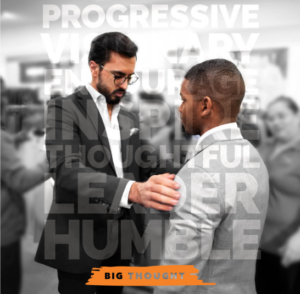Truth vs. Perception: Understanding the Power of Education
Big Thought presents Truth Versus Perception intimately explores and shares experiences of the Fellows of The Fellowship Initiative and supporters. This multi-part series is designed to dispel the negative, perceived notions of young men of color.
These are their words. Their experiences. Their truths. Listen and unlearn.

It’s not that Myles Melville didn’t understand the importance of education. Melville was a student-athlete where he played basketball and took his academic seriously — a family trait instilled by his parents, that education was a foundation for the future.
But it wasn’t until he found himself sitting in his coach’s office being told there wasn’t a place for him on the team, that the true power of education clicked. His a 3.2 grade point average opened doors and led Melville to transfer to Northeastern University. “Although the coach didn’t have plans for me, my education background had plans for me.”
Today, building on those plans have led to Melville’s role as the operations manager for the Melville Family Foundation and his place on Big Thought’s Board of Directors. In both organizations, education is a North Star.
The Melville Family Foundation works to improve the lives of Black and Brown children in Dallas’ southern sector through economic stability, food security and academic excellence. With a mission that similarly centers equity, Big Thought works to close the opportunity gap by equipping youth in underserved communities with the skills and tools they need to imagine and create their best lives and a better world.
“But in reality, education is the direct route to power, respect and money.”
“A lot of the times, you may have a different understanding or comprehension of education, because your prior experiences or what you’ve been told put it in a different priority group for you,” Melville said. “But in reality, education is the direct route to power, respect and money.”
For Melville, it’s important to help youth restructure their understanding of what education can be and the opportunities it can provide. It’s part of the reason why he supports The Fellowship Initiative (TFI), a leadership program offered in partnership by Big Thought and JP Morgan Chase. Over three years, young men of color, who start as sophomores and continue the program until graduation, work toward college readiness and learn the skills they need to excel professionally and personally.
Growing up, Melville’s own experience with education included moving around relative to his father’s career advancements which resulted in changing schools every two years or so. And in West Des Moines, Iowa, it meant realizing he was Black for the first time while walking to the school bus, something that should have been normal for most American students.
One morning, Melville noticed his neighbor pointedly watching him and his brothers through her window — she did the same when they got back that afternoon. And the next day, and the next. When Melville’s mother found out what was happening, she went to speak to the neighbor.
“She introduces herself, says we just moved down the street and then asks, ‘Is there a reason you’re staring at my boys as they’re going to school?’” Melville said. “I’ll never forget this: The woman said it was the first time she’d seen Black people.”
Although that was years ago, today West Des Moines’s population is more than 80 percent white, and the experience of living there was impactful for Melville. “When you’re in a city like that, then it’s like, well, what is Black?” he said. “You’re questioning your Blackness, then you question others’ Blackness — you know, how to speak, your dialogue, your word choice, your dress. It’s so complex.”
“When you’re in a city like that, then it’s like, well, what is Black?” he said. “You’re questioning your Blackness, then you question others’ Blackness — you know, how to speak, your dialogue, your word choice, your dress.
It’s so complex.”
Later, when Melville attended middle school in the Plano area, it was a similar story, which led to what he calls a conflict of character. “It was a big question for me: What’s defining Black at this point, in a majority white area? How do you drive or exude your Blackness in an overwhelmingly white area?”
Identity is an important part of The Fellowship Initiative, where the goal is for young men to view their Brownness or their Blackness not as impediments but as badges of honor. And their mere presence is normal and expected as their white counterpart. It’s part of a hope that they can be proud of their heritage and where they come from, while also acknowledging the way the world views them.
“I love everything Big Thought does, specifically TFI. Getting young males to commit to a weekend in itself, not to mention over an extended period of time, is phenomenal,” Melville said. “And then to see some of the aspirations these scholars come out [of the program] with, and how they not only elaborate verbally but show in their actions that they care — it pushes me beyond words.”
Applications for the next cohort are now being accepted for high school sophomores.
Read more from this series:
Part 1: Truth vs. Perception – Representation Matters
Part 2: Truth vs. Perception – The Importance of Possibility